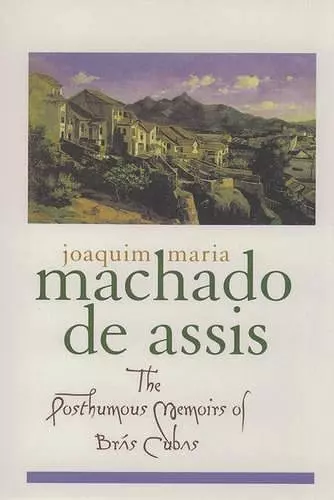The Posthumous Memoirs of Brás Cubas
Joachim Maria Machado de Assis author Gregory Rabassa translator Enylton de Sá Rego editor
Format:Hardback
Publisher:Oxford University Press Inc
Published:19th Feb '98
Currently unavailable, and unfortunately no date known when it will be back

"Be aware that frankness is the prime virtue of a dead man," writes the extraordinary narrator of The Posthumous Memoirs of Bras Cubas. "The gaze of public opinion, that sharp and judgmental gaze, loses its virtue the moment we tread the territory of death. I'm not saying that it doesn't reach here and examine and judge us, but we don't care about the examination or the judgment. My dear living gentlemen and ladies, there's nothing as incommensurable as the disdain of the deceased." Indeed, writing his memoirs from the other world gives Bras Cubas a certain freedom from both social and literary conventions. And while he may be dead, he is surely one of the liveliest characters in fiction, a product of one of the most remarkable imaginations in all of literature, Brazil's greatest novelist of the nineteenth century, Joaquim Maria Machado de Assis. Famous in his lifetime and still revered throughout Latin America, Machado de Assis has remained little known in the English-speaking world. He represents an important antecedent for the experimental fictions of Borges, Cortazar, Fuentes, and others. In this wildly inventive book, de Assis is, in fact, much closer to such postmodern masters as Calvino, Kundera, and Marquez than to the conventions of the nineteenth century realist and romantic novel, which the narrator continually and hilariously mocks. Irrepressibly whimsical, irreverent, chatty, and charmingly self-absorbed, Bras Cubas is forever intruding into his narrative, questioning, lecturing, and elbowing the reader, commenting on his writing and its highly unusual style--"this book and my style are like drunkards, they stagger left and right, they walk and stop, mumble, yell, cackle, shake their fists at the sky, stumble, and fall"--congratulating himself on particular chapters, wondering whether to cut others out, and interrupting his life story with all manner of digressions, from a philosophical discourse on the purpose of the nose to a visionary ride on the back of a rhinoceros to find the origin of the centuries. Along the way we're treated to a marvelous cast of characters, including the outlandish philosopher Quincas Borcas, who asserts that "asceticism is the perfection of human idiocy," and Virgilia, the beautiful married woman with whom Bras Cubas carries on a passionate and not-so-secret love affair. By turns flippant and profound,...
[comment for series] "With the Library of Latin America, Oxford has opened up a new frontier that may prove as exciting and enigmatic as the continent itself."--The Herald, South Carolina "The wit and irony of the Brazilian classic are palpable."--Thomas E. Skidmore "Language has always been a barrier to our unity as the Americas, and most especially to our reading of each other's literatures. Now with this new series by Oxford University Press, the library of Latin America is literally open to North Americans and to English speakers everywhere. This is an important series for anyone who is prevented from knowing the classics of the southern half of this hemisphere because of not knowing the language. Bienvenidos to these new readers!"--Julia Alvarez "With a masterful translation by Rabassa and a contextual foreword and afterword that tell us that the work anticipates Calvino and Garcia Marquez, this book is recommended for collections rich in Latin American and literary holdings."--Library Journal "Machado de Assis wrote some of the most deliriously adventurous fiction of the last century."--Sarah Kerr, Lingua Franca "The lightning bolts flung down at us by the gods are meant to wound. What reach us from Machado's Parnassus are, instead, flashes of truth that make the darkness recede."--Lauren Weiner, The New Criterion "Written at the same moment of literary history when Henry James was writing its aesthetic opposite, The Portrait of a Lady, Machado de Assis's novel...belongs to a long line of brilliantly odd and (realtively) outrageous works like Laurence Stern's Tristam Shandy and Xavier de Maistre's Voyage Around My Room.... A very great novel indeed."--Gary Amdahl, The Nation "Although Machado has been available before in the U.S....he, like many of the others represented in LoLA, have not been given the recognition they deserve. One hopes that these beautifully designed, carefully translated volumes will rectify that."--Publishers Weekly "Machado offers the infectious pleasures of a 19th-century writer who is more modern than some of our so-called moderns.... The mystery of Machado is that he combines distanced irony with intimations of encroaching darkness, self-reflexive antics with soul."--Bill Marx, Boston Globe "Machado de Assis is Brazil's greatest novelist, and ranks high among the most appealing writers in the world.... Though he lived mainly in the 19th century, Machado possesses an almost postmodern sensibility--playful, ironic and tricky."--Book World
ISBN: 9780195101690
Dimensions: 211mm x 147mm x 28mm
Weight: 386g
240 pages